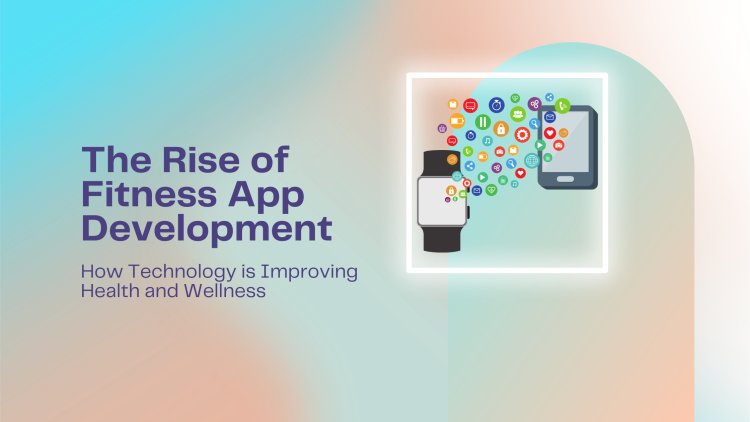Fitness App Development: How Technology is Improving Health and Wellness
Fitness app development is booming, with the market expected to grow to $4.4 billion by 2028. These apps offer personalized workout plans, progress tracking, and motivation, with many integrating wearable devices for real-time health data. Our fitness app development company creates user-friendly, customized solutions that keep users engaged, helping businesses meet the growing demand for tech-driven health and wellness tools.

In recent years, fitness app development has become a booming industry. More and more people are turning to technology to help them get in shape, track their progress, and live healthier lives. Fitness apps have moved beyond just counting steps; they now offer a wide range of features, from personalized workout plans to real-time health monitoring, all aimed at making fitness more accessible and engaging.
The Growth of Fitness Apps
The global fitness app market is experiencing rapid growth. According to a report by Grand View Research, the global fitness app market was valued at $4.4 billion in 2020 and is expected to grow at a compound annual growth rate (CAGR) of 21.6% from 2021 to 2028. This rapid growth shows just how much people are investing in their health and how vital fitness apps are becoming in their daily routines.
Why Fitness Apps Matter
Fitness apps are changing the way we approach health and fitness. They offer personalized solutions based on a user's individual needs, preferences, and goals. Whether you want to lose weight, build muscle, improve endurance, or just stay active, fitness apps can help you track your progress and provide motivation along the way.
Here are some key reasons why fitness apps are so popular:
-
Convenience: Fitness apps are available 24/7, so users can work out whenever it fits into their schedule. Whether you're at home, in the gym, or on vacation, your workout is just a tap away.
-
Personalized Plans: Many fitness apps offer customized workout plans tailored to your goals. These apps use data like your age, weight, fitness level, and preferences to create plans that are specifically designed for you.
-
Tracking & Analytics: Fitness apps track everything from steps and calories burned to heart rate and sleep patterns. This data is then analyzed, giving users insights into their performance and overall health.
-
Motivation & Community: Fitness apps often include features like achievements, badges, and social sharing to keep users motivated. Many apps also offer virtual communities, where users can connect with others on similar fitness journeys.
-
Integration with Wearables: With the rise of wearable tech like smartwatches and fitness bands, fitness apps are now integrating with these devices to provide real-time health data. This allows users to monitor things like heart rate, sleep, and activity levels throughout the day.
Key Stats on Fitness Apps
- Over 1 in 4 people use a fitness app globally, according to Statista.
- In 2022, 72% of users downloaded a fitness app specifically for home workouts, which skyrocketed during the pandemic.
- According to Mobile App Daily, the most popular types of fitness apps are workout tracking, nutrition, and weight loss apps, with over 45% of fitness app users engaging in some form of weight management tracking.
Fitness App Development: What We Offer
For businesses looking to enter the fitness app space, it's essential to understand what makes a successful app. At our fitness app development company, we focus on providing solutions that are easy to use, highly engaging, and truly beneficial for users. Here’s how we approach fitness app development:
-
Custom Solutions: We work closely with our clients to develop fitness apps that are aligned with their brand and meet the needs of their target audience. Whether it's a personalized workout app or a nutrition tracker, we create apps that are unique and tailored to your specific goals.
-
User-Friendly Design: The key to a successful fitness app is a simple, intuitive design. Our apps are built with the user in mind, ensuring that they are easy to navigate, visually appealing, and enjoyable to use.
-
Integration with Wearables: As wearables continue to grow in popularity, we ensure that our fitness apps integrate seamlessly with devices like Apple Watch, Fitbit, and Garmin, allowing users to get real-time data and track their progress effectively.
-
Data Analytics: We include built-in analytics that provide valuable insights into user behavior, health trends, and app performance, helping our clients make data-driven decisions and improve their app offerings.
-
Continuous Support: Once your app is live, we offer ongoing maintenance and updates to keep it running smoothly and in line with the latest technology trends and user needs.
Conclusion
Fitness app development is no longer just about creating an app; it's about offering a solution that motivates, tracks, and helps people reach their fitness goals. With the fitness app market continuing to grow, now is the perfect time to invest in developing your own app. By focusing on customization, user experience, and integration with wearables, your fitness app can stand out and help people live healthier, more active lives.
Whether you’re a fitness brand, gym owner, or health-focused startup, fitness apps have the potential to create lasting relationships with users while helping them achieve their fitness dreams. It’s time to embrace the power of technology and take fitness to the next level.
What's Your Reaction?





















